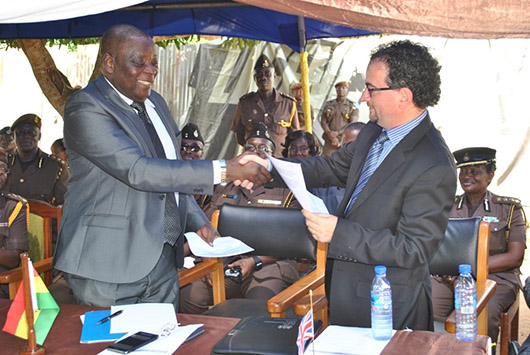
Mr. Mark Woyongo shaking hands with Mr. Jon Benjamin
Ghana and Britain have signed a Memorandum of Understanding (MOU), for an amount of 483,000 pounds,to support projects of the Ghana Prisons Service, to help de-congest the prisons to meet international standards.
A statement issued to the Ghana News Agency on Wednesday, said the British High Commissioner to Ghana, Mr Jon Benjamin signed for the British government, while Mr Mark Owen Woyongo, Minister of the Interior, initialed for the government.
The statement said when successfully completed, the projects will help de-congest the prisons, and assist in the implementation of best practices of treating offenders, especially those on remand.
Under the agreement, the British government will renovate and upgrade some facilities at the Nsawam, Ankaful, and Sekondi Prisons, with special mention of the Nsawam Prison infirmary, which will be refurbished and re-equipped to improve healthcare delivery to inmates, officers and their dependants.
It stated that a court will be constituted at the Nsawam Medium Security Prison, to handling only remand cases.
The British government will also provide two new buses to transport inmates from the Prison to the courts and back.
Mr Benjamin revealed that the support to the Ghana Prisons was based on reports submitted by the United Nations rapporteur, and a United Kingdom expert, who were invited separately to assess the standards of Ghana’s prisons.
He said the British government was committed to improving the living standards of the Ghanaian citizenry, especially the underprivileged.
On his part, the Minister of the Interior, Mr Woyongo, bemoaned the overcrowding and poor health facilities in the Ghanaian prisons, and reiterated government’s commitment to introduce alternative sentences to imprisonment, such as community service, and suspended sentences, among others, to help address the issue of spending scarce resources on keeping relatively harmless inmates in prison custody.
Madam Matilda Baffour Awuah, Controller General of the Ghana Prisons service, expressed her profound gratitude to both governments for their immense support to the Prisons Service, and called for more assistance from foreign embassies, the corporate world, philanthropists and the general public, in order to holistically solve the overcrowding problems in Ghana’s prisons, and to improve the lot of offenders, while upholding their human rights..
She said she was committed to making the Ghana Prisons Service a model reformatory organization in Africa, and the world, with the kind of support the UK government was giving.
Source: GNA























